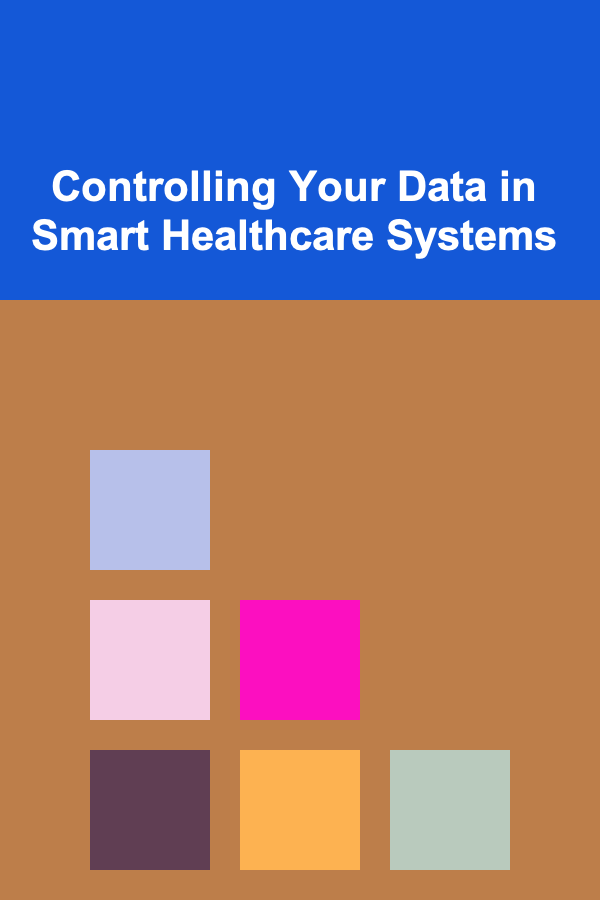
Controlling Your Data in Smart Healthcare Systems
ebook include PDF & Audio bundle (Micro Guide)
$12.99$9.99
Limited Time Offer! Order within the next:

Smart healthcare systems, powered by advancements in artificial intelligence (AI), the Internet of Things (IoT), and big data analytics, hold immense potential to revolutionize healthcare delivery, improve patient outcomes, and reduce costs. These systems collect, analyze, and share vast amounts of sensitive personal data, ranging from medical history and biometric information to lifestyle habits and genetic profiles. While this data-driven approach offers numerous benefits, it also raises significant concerns about data privacy, security, and control. This article explores the critical importance of empowering individuals to control their data within smart healthcare systems and provides practical strategies for achieving this goal.
The Promise and Peril of Smart Healthcare
The transformative potential of smart healthcare is undeniable. Imagine a world where:
- Personalized medicine is the norm, with treatments tailored to an individual's unique genetic makeup and lifestyle.
- Wearable sensors continuously monitor vital signs, alerting healthcare providers to potential health problems before they become serious.
- AI algorithms analyze medical images with greater accuracy than human radiologists, leading to earlier and more accurate diagnoses.
- Remote patient monitoring systems allow individuals to receive care from the comfort of their homes, reducing the need for costly hospital visits.
- Predictive analytics identify individuals at high risk for developing chronic diseases, enabling proactive interventions to prevent illness.
However, realizing this vision requires access to vast amounts of personal health data. This data is collected from a variety of sources, including:
- Electronic Health Records (EHRs): Comprehensive digital records of a patient's medical history, including diagnoses, treatments, medications, and test results.
- Wearable Devices: Smartwatches, fitness trackers, and other wearable sensors that continuously monitor physiological parameters such as heart rate, sleep patterns, and activity levels.
- Mobile Health Apps: Applications designed to track various aspects of health and wellness, such as diet, exercise, and medication adherence.
- Genomic Sequencing: Analysis of an individual's DNA to identify genetic predispositions to certain diseases.
- Remote Monitoring Systems: Devices that monitor patients remotely, such as blood pressure monitors, glucose meters, and cardiac implantable electronic devices (CIEDs).
- Imaging Data: X-rays, MRIs, CT scans, and other medical images.
- Social Media and Online Activity: Information shared on social media platforms and through online searches that may provide insights into an individual's health behaviors and risk factors.
The collection and use of this data raise several critical concerns:
- Privacy Violations: Unauthorized access to or disclosure of sensitive personal health information can have devastating consequences, including discrimination, embarrassment, and emotional distress.
- Security Breaches: Healthcare data is a prime target for cyberattacks, and data breaches can expose millions of individuals' private information.
- Lack of Transparency: Individuals may not be fully aware of how their data is being collected, used, and shared.
- Data Bias and Discrimination: AI algorithms trained on biased data can perpetuate and amplify existing health disparities.
- Loss of Control: Individuals may feel powerless to control how their data is used and shared, leading to a sense of vulnerability and distrust.
- Secondary Use of Data: Data initially collected for one purpose may be used for other purposes without the individual's explicit consent. This can include research, marketing, or even insurance underwriting.
Addressing these concerns is paramount to building trust in smart healthcare systems and ensuring that these technologies are used ethically and responsibly. Empowering individuals to control their data is a fundamental aspect of this effort.
The Importance of Data Control
Data control refers to the ability of individuals to understand, manage, and make decisions about their personal data. In the context of smart healthcare, this means giving patients the power to:
- Access their data: Easily access and review their complete health records, including data collected from wearable devices and mobile health apps.
- Understand how their data is used: Receive clear and concise explanations of how their data is being used for diagnosis, treatment, research, and other purposes.
- Correct inaccuracies: Identify and correct any errors or inaccuracies in their health records.
- Control who has access to their data: Grant or deny access to their data to specific healthcare providers, researchers, or other third parties.
- Withdraw consent: Withdraw their consent to the use of their data at any time.
- Port their data: Transfer their data from one healthcare provider to another or to a personal health record system.
- Delete their data: Request the deletion of their data, subject to legal and regulatory requirements.
Empowering individuals with data control offers numerous benefits:
- Increased Trust: When individuals feel that they have control over their data, they are more likely to trust healthcare providers and smart healthcare systems.
- Improved Patient Engagement: Data control can encourage patients to actively participate in their own healthcare, leading to better health outcomes.
- Enhanced Data Accuracy: By reviewing and correcting their data, individuals can help ensure that their health records are accurate and up-to-date.
- Reduced Risk of Discrimination: Data control can help prevent the misuse of data for discriminatory purposes.
- Greater Autonomy: Data control empowers individuals to make informed decisions about their health and well-being.
- Ethical Alignment: It aligns smart healthcare systems with fundamental ethical principles of respect for autonomy and beneficence.
Strategies for Achieving Data Control
Implementing data control in smart healthcare requires a multi-faceted approach involving technical, legal, and organizational considerations. Here are some key strategies:
1. Strong Legal and Regulatory Frameworks
Robust legal and regulatory frameworks are essential to protect individuals' data privacy and security. These frameworks should include:
- Data Privacy Laws: Comprehensive data privacy laws that define the rights of individuals with respect to their personal data, including the right to access, correct, control, and delete their data. Examples include the Health Insurance Portability and Accountability Act (HIPAA) in the United States and the General Data Protection Regulation (GDPR) in the European Union.
- Data Security Standards: Mandatory data security standards that healthcare providers and technology vendors must adhere to in order to protect patient data from unauthorized access, use, or disclosure. These standards should address both technical and organizational security measures.
- Data Breach Notification Laws: Laws that require healthcare providers and technology vendors to notify individuals in the event of a data breach that compromises their personal health information.
- Regulations on the Use of AI in Healthcare: Clear guidelines and regulations governing the use of AI in healthcare, including provisions to address data bias, transparency, and accountability.
- Enforcement Mechanisms: Strong enforcement mechanisms to ensure that healthcare providers and technology vendors comply with data privacy and security laws and regulations. This includes the ability to impose penalties for violations and to provide redress for individuals who have been harmed by data breaches or privacy violations.
2. Privacy-Enhancing Technologies (PETs)
Privacy-enhancing technologies (PETs) are technical measures that can be used to protect individuals' privacy while still allowing data to be used for valuable purposes, such as research and healthcare delivery. Some examples of PETs include:
- Anonymization: Removing or masking identifying information from data to prevent individuals from being re-identified. However, simple anonymization techniques can sometimes be reversed through re-identification attacks, so more sophisticated techniques are needed.
- Differential Privacy: Adding carefully calibrated noise to data to protect the privacy of individuals while still allowing researchers to derive useful insights from the data. Differential privacy provides a mathematically rigorous guarantee of privacy protection.
- Federated Learning: Training machine learning models on decentralized data without sharing the data itself. This allows researchers to leverage data from multiple sources while preserving the privacy of individuals.
- Homomorphic Encryption: Performing computations on encrypted data without decrypting it. This allows researchers to analyze data without ever having access to the underlying plain text.
- Secure Multi-Party Computation (SMPC): Allowing multiple parties to jointly compute a function on their private data without revealing their individual inputs to each other.
3. User-Centric Design
Smart healthcare systems should be designed with the user in mind, ensuring that individuals have easy access to their data and clear control over how it is used. This includes:
- Intuitive Interfaces: User-friendly interfaces that make it easy for individuals to access, understand, and manage their data.
- Granular Consent Mechanisms: The ability to grant or deny consent for specific uses of their data. This means providing individuals with more control than simply accepting or rejecting a blanket privacy policy. For example, a patient might consent to their data being used for research on a specific disease but not for marketing purposes.
- Transparent Data Use Policies: Clear and concise explanations of how data is being collected, used, and shared, written in plain language that is easy for individuals to understand.
- Data Portability: The ability to easily transfer their data from one healthcare provider to another or to a personal health record system. This promotes interoperability and gives individuals more control over their data.
- Data Deletion Options: The ability to request the deletion of their data, subject to legal and regulatory requirements. This is a fundamental right under many data privacy laws.
- Data Security Measures: Implementation of robust data security measures to protect patient data from unauthorized access, use, or disclosure.
4. Education and Awareness
Many individuals are not aware of their rights with respect to their personal health data or the risks associated with sharing their data. Education and awareness campaigns can help individuals:
- Understand their rights: Learn about their rights under data privacy laws and regulations.
- Recognize privacy risks: Identify potential privacy risks associated with sharing their data.
- Make informed decisions: Make informed decisions about whether to share their data and how to protect their privacy.
- Utilize available tools: Learn how to use the tools and features provided by smart healthcare systems to control their data.
These campaigns should be targeted at different audiences, including patients, healthcare providers, and technology developers. They should use a variety of communication channels, such as websites, social media, and educational materials.
5. Ethical Frameworks and Governance
Beyond legal and technical measures, ethical frameworks and governance structures are needed to guide the responsible development and deployment of smart healthcare systems. This includes:
- Ethical Guidelines for AI in Healthcare: Developing ethical guidelines for the use of AI in healthcare, addressing issues such as data bias, transparency, accountability, and fairness.
- Institutional Review Boards (IRBs): Strengthening the role of IRBs in reviewing research involving human subjects, particularly research involving large datasets of personal health information.
- Data Governance Policies: Implementing data governance policies that define the roles and responsibilities of different stakeholders in the management of data within smart healthcare systems.
- Independent Oversight Bodies: Establishing independent oversight bodies to monitor the ethical and responsible use of data in smart healthcare.
- Promoting a Culture of Privacy: Fostering a culture of privacy and security within healthcare organizations and technology companies.
6. Blockchain Technology
Blockchain technology, with its inherent security and transparency features, can play a significant role in enhancing data control in smart healthcare. Potential applications include:
- Secure Data Storage: Storing patient data on a blockchain to ensure its integrity and prevent unauthorized access.
- Decentralized Access Control: Using blockchain-based smart contracts to manage access to patient data, allowing patients to grant or revoke access permissions in a transparent and auditable manner.
- Data Provenance Tracking: Tracking the provenance of patient data on a blockchain, providing a clear audit trail of how the data has been used and shared.
- Identity Management: Using blockchain-based identity management systems to securely authenticate patients and healthcare providers.
While blockchain offers promising solutions, it's important to address challenges related to scalability, interoperability, and regulatory compliance.
7. Auditing and Accountability Mechanisms
Regular auditing of data access and usage is crucial to ensure compliance with privacy policies and regulations. Implementing robust accountability mechanisms is also essential.
- Access Logs: Maintaining detailed access logs that record who accessed which data, when, and for what purpose.
- Regular Audits: Conducting regular audits of data access logs to identify any unauthorized or suspicious activity.
- Accountability Frameworks: Establishing clear accountability frameworks that define the responsibilities of individuals and organizations for protecting patient data.
- Whistleblower Protection: Providing protection for whistleblowers who report privacy or security violations.
Conclusion
Smart healthcare systems hold enormous promise for improving healthcare delivery and patient outcomes. However, realizing this potential requires a commitment to protecting individuals' data privacy and empowering them to control their data. By implementing strong legal and regulatory frameworks, privacy-enhancing technologies, user-centric design principles, education and awareness campaigns, ethical frameworks, blockchain technology, and robust auditing mechanisms, we can build trust in smart healthcare systems and ensure that these technologies are used ethically and responsibly. The key is to prioritize the individual's right to autonomy and control over their personal health information, fostering a future where healthcare innovation and data privacy coexist harmoniously.

Benefits of Utilizing Public Parks and Recreational Areas for Free Activities with Family and Friends
Read More
How to Create a Warm and Inviting Home on a Budget
Read More
How to Organize Medical Records for Easy Access
Read More
How to Organize Your Inventory by Room for Easy Access
Read More
How to Sell Homemade Jams and Preserves at Local Markets: A Step-by-Step Guide
Read More
How to Find Resilience Through Mindfulness
Read MoreOther Products

Benefits of Utilizing Public Parks and Recreational Areas for Free Activities with Family and Friends
Read More
How to Create a Warm and Inviting Home on a Budget
Read More
How to Organize Medical Records for Easy Access
Read More
How to Organize Your Inventory by Room for Easy Access
Read More
How to Sell Homemade Jams and Preserves at Local Markets: A Step-by-Step Guide
Read More